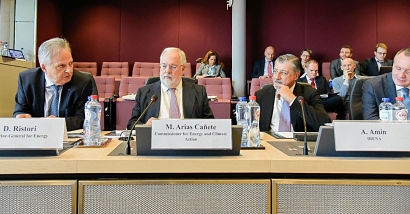
Countries at the forefront of the energy transformation are getting more than a third of their energy from variable renewables like solar and wind, and they’re doing it in a cost-effective manner. By making use of innovative solutions that allow to integrate a higher share of renewables into power systems, innovation holds the key to a cost-effective global energy transformation.
These findings come from a first-of-a-kind mapping and analysis of innovations that will transform the power sector, launched by the International Renewable Energy Agency (IRENA) today in Brussels. IRENA’s Director-General Adnan Z. Amin presented the report in the presence of EU Energy and Climate Action Commissioner Miguel Arias Cañete at an official launch event hosted by the European Commission. The report “Innovation Landscape for a Renewable-Powered Future: solutions to integrate variable renewables” contains the most in-depth assessment of the power sector transformation to date. It shows how synergies between different innovative solutions in business models, market design, enabling technologies and system operation are lowering the cost of integrating high shares of variable renewable energy (VRE), while making energy production, transmission and consumption more flexible and empowering a new generation of energy consumers.
Decarbonising the global power sector in line with the Paris Agreement objectives will require an 85 percent share of renewable energy in total electricity generation by 2050, IRENA’s 2050 Roadmap estimates. By then, variable renewables would account for 60 percent of the total power generated globally. Moving to a new phase where the massive but cost-effective scale-up of renewables power is crucial, the power sector transformation is strongly accelerated by innovation trends in digitalisation, decentralisation and electrification of the end-use sectors. Understanding and learning from the experiences from leading countries in VRE integration is crucial to replicate and enhance innovation that can accelerate this transformation.
With close to 15 percent of VRE share in annual electricity generation today, the EU has the highest levels of variable renewables in power systems globally.
“Europe has shown tremendous leadership in initiating the system-wide innovations needed to support the widespread adoption of renewables and decarbonise the global economy” said IRENA Director-General Adnan Z. Amin. “The region’s success shows us that innovation is creating an energy transformation that is technically feasible and economically attractive. Innovation is the engine powering the energy transition and the global pace of innovation is accelerating. IRENA’s new report will provide a clear, navigable and comprehensive guide on innovations being piloted around the world, aiming to support informed decision-making by all countries to deploy low-cost renewables and accelerate the global energy transition further.”
EU Commissioner for Energy and Climate Action Miguel Arias Cañete reiterated the importance of renewable energy in helping the region to meet its climate objectives:
“The EU has already started the modernisation and transformation towards a climate neutral economy” Cañete added. “Implementing the EU’s Clean Energy package will further boost innovation, and the EU can continue to show leadership and support the rest of the world by exporting innovative solutions in the fight against climate change. Innovation is central to our efforts, and this report from IRENA is a valuable contribution to become the world's first major economy to go climate neutral by 2050.”
The new report identifies 30 key innovations and 11 innovative solutions in development by pioneering companies and backed by far-sighted governments around the world. By showcasing many examples of projects and pilots for the power sector transformation across the globe, it supports policy makers in adopting innovation frameworks built on the combination and synergies between innovative solutions. As a unique toolbox it will help decision makers to rethink their power systems and implement solutions that account for specific national circumstances.
For additional information:
International Renewable Energy Agency (IRENA)
“Innovation Landscape for a Renewable-Powered Future: solutions to integrate variable renewables” (report)

